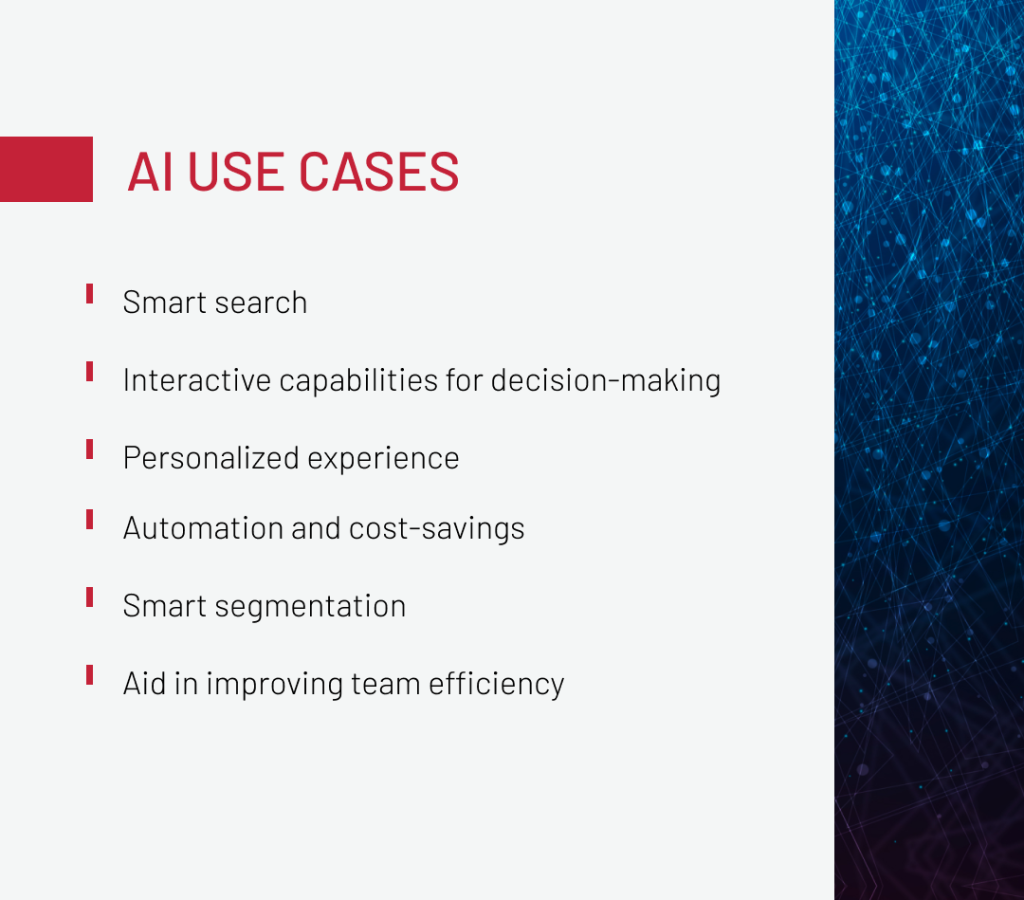How Global Brands Use Artificial Intelligence in Ecommerce: From User Journey to Inside Operations

AI is everywhere now, creeping into industries, shaking up norms, and pushing boundaries. Ecommerce is no exception, with Artificial Intelligence in ecommerce unlocking smarter operations, hyper-personalized experiences, and fresh ways to innovate. But it’s not all smooth sailing.
For Fortune 500 companies and other global corporations, security concerns add a layer of caution, forcing them to find ways to harness AI while safeguarding their platforms’ stability and security.
In this article, we break down how to use AI in ecommerce, sharing insights from our work with enterprise ecommerce clients.
Quick Tips for Busy People
Take a glimpse at using AI in ecommerce.
- AI in ecommerce: AI transforms ecommerce with personalized experiences, dynamic pricing, and automated workflows, improving customer satisfaction, optimizing inventory, and driving growth for online retailers.
- AI and global corporations: Expert Soft implemented AI-driven systems for global brands to empower them with image search, multilingual translation, virtual try-ons, and virtual assistants. Along with smart customer segmentation and advanced developer efficiency.
- SAP Commerce Cloud AI: SAP now offers two AI-powered toolkits for SAP Commerce Cloud users, enabling tailored experiences, dynamic pricing, and cross-selling to optimize customer journeys and increase revenue.
AI Tech in Ecommerce
The global ecommerce Artificial Intelligence market is showing strong growth. Valued at around $7.25 billion in 2024, the market is likely to reach a value of around $64.03 billion by 2034, growing at a compound annual growth rate (CAGR) of 24.34%.
This growth highlights the increasing adoption of AI-driven solutions across the ecommerce industry. Businesses recognize the potential of AI to transform their operations and customer interactions. To understand this transformation better, let’s explore the key categories of ecommerce AI technologies:
-
Machine learning
Unveils patterns in customer behavior for customized product recommendations, dynamic pricing optimization, and efficient inventory management.
-
Natural language processing (NLP)
It’s what powers chatbots and voice assistants, giving them conversational interfaces for better customer engagement and easier search experiences
-
Intelligent data analysis
Processes large datasets to uncover trends, enhance decision-making, and predict future demands of the business so that it remains agile
-
Predictive analytics
Forecasts customer needs and behaviors, supporting proactive marketing campaigns and precise inventory planning for better efficiency and engagement.
Now, let’s see which AI capabilities we at Expert Soft implemented for our clients within our custom ecommerce website development services.
How Expert Soft Clients Use AI
Within the clients’ projects, we use AI for a variety of cases. From an advanced search to smart segmentation, each company has found its unique way of implementing AI. Details are below.

Smart search
Imagine a search engine speaking the language of images instead of words so you have all the ways to find what you want, even though you can’t name it. With image search powered by AI, customers can simply upload photos into a search bar and get spot-on results, turning a potentially frustrating experience into a seamless one.
This is what we implemented for a leading Eastern European automotive parts manufacturer: if a customer didn’t know the exact name of a part, they could upload a photo directly to the search bar. A third-party system integrated into the platform processes the image with the Machine Learning algorithm and performs a search through the catalog. The system responds with the product code, which is then transformed into a text query to work perfectly with the text-based search engine on the ecommerce platform.
The integration ensures that customers receive accurate and swift search results while significantly raising both usability and satisfaction levels.
Interactive capabilities for decision-making
While modern customers buy virtually everything online now, beauty products can still cause hesitations due to the inability to try them on before purchase. A global beauty retailer overcame this with an AI-driven virtual try-on feature.
The moment a customer lands on the PDP (product description page) of any cosmetic product, they get to engage with the live feature and see in real time how that product will look on their face. This AI-driven feature virtually applies the makeup, allowing customers to interactively try different shades and finishes. It lifts the shopping experience with much higher levels of customer engagement and improves decision-making.
Personalized experience
When there is too much data available, performing research can be a daunting and time-consuming task, even within a single website. This has been the typical challenge of a globally recognized credit rating agency that offers a wide range of research and data across multiple parameters.
To simplify data search, the company asked Expert Soft to implement an AI-driven assistant for better user experience and simplified access to complex datasets. Within integrated AI-driven chat, users could interact with the assistant via natural language questions to retrieve details, analyze rating trends, and perform other financial research.
This automated and streamlined navigation enabled users to access insights as efficiently as possible and make faster and more informed decisions, which elevated overall satisfaction.
Automation and cost-savings
These are probably the main reasons AI has gained such popularity. And ecommerce businesses are no exception.
To save resources, a high-end luxury brand replaced manual content translation into various languages with AI. Instead of using manual power and waiting a long time for the task to be completed, the company now gets the result much faster and cheaper with AI.
This has not only cut down operational costs but also ensured uniform quality across languages, streamlining global communication and enhancing the international presence of the brand.
Smart segmentation
In a crowded marketplace, standing out requires precision. AI-powered keyword recommendations dynamically generate engaging, category-specific terms that captivate users. By connecting customers with tailored product suggestions, this technology enhances discoverability and creates a more personalized shopping journey.
For a global health and beauty retailer, we added such AI-driven recommendations. This feature uses third-party AI for the dynamic generation of category-specific keywords displayed on the site to increase user interaction. Upon clicking, a user is led to a dynamically created page that fetches and displays products related to the clicked keyword.
The third-party system manages the product associations and filtering logic for precise and efficient delivery of relevant results. This makes product discoverability much better and provides a more customized shopping experience.
Aid in improving team efficiency
Not only is AI useful for ecommerce customers, our developers know how to leverage the technology to improve working efficiency. For example, to streamline tech upgrades with AmazonQ.
When you choose the tech version you want to migrate, the tool defines the project module, analyzes project dependencies, identifies compatibility issues, and based on the info prepares a set of changes to implement. While developers still had to verify the results and cover the occasional gap in the tool’s output, AmazonQ considerably reduced the time and effort involved in such migrations.
However, in other cases, such as using AmazonQ as an assistant during regular code development, the technology didn’t quite prove its value for our team. After all, our goal isn’t just to write code for the sake of code or to do it as quickly as possible. We aim to create high-quality code that drives real results. So, for us, AI can be a useful tool in specific situations, but it’s far from replacing the expertise and effort required to deliver exceptional work.
FYI: All the features mentioned above were enabled through third-party integrations within our retail software development services. This means that, in many cases, the implementation of AI doesn’t require in-house AI/ML expertise, but does require skilled developers experienced in complex integrations.
As at Expert Soft, our primary focus is SAP Commerce Cloud development, we stay on top of its latest features and advancements, keeping an eye on whether SAP is integrating AI capabilities. And it certainly is. Here’s a quick overview for SAP Commerce Cloud users.
AI Capabilities for SAP Commerce Cloud
For now, SAP Commerce Cloud offers two key toolkits of dedicated AI capabilities that can be seamlessly integrated into the SAP Commerce Cloud platform.
-
SAP CX AI toolkit
The toolkit uses AI to reinvent customer engagement. It helps businesses support tailored suggestions, dynamic pricing adjustments, and design targeted promotions using real-time data. These capabilities help in improving the shopping experience so customers get only relevant suggestions and attractive deals aligned with their preferences and behaviors.
-
Intelligent selling services
Supporting cross-selling and upselling with data-driven insights, this AI-driven solution focuses on driving revenue growth. It analyzes customer purchase patterns to forecast their needs and further recommends complementary products or upgrades to improve conversion rates and raise average order values.
Presenting as independent modules, these AI tools can be integrated into SAP Commerce Cloud to empower ecommerce businesses to deliver engaging experiences, personalized to each customer, while optimizing operational efficiency and boosting revenue.
AI and Customer Data Security
Using AI in ecommerce for personalization of experiences and optimization of sales strategies is invaluable. Equally important, however, is its critical role in strengthening customer data security. Let’s see how AI safeguards sensitive information.
-
Detecting anomalies
Machine learning algorithms are used to monitor data access patterns to detect unusual or unauthorized activities. Finding these potential breaches early allows AI to prevent misuse of data and strengthen overall security against external threats.
-
Automating compliance
AI makes it easier to adhere to data privacy regulations, such as GDPR, by handling protocols for storage, access, and deletion. It keeps organizations in effortless compliance, reducing risks of costly penalties for non-compliance.
-
Reducing insider threats
Predictive analytics monitor employee activities to flag suspicious behaviors that may indicate internal risks. By identifying unusual patterns, AI minimizes the potential for unauthorized data access or breaches caused by insiders.
To Sum Up
While Artificial Intelligence in ecommerce does transform the way businesses interact with customers, many of the features mentioned in this article can still be implemented without AI. Personalized customer journeys, virtual assistants, and other interactive experiences are all achievable, but with AI, they become far more efficient. That’s why AI has firmly established itself as a game-changer and isn’t going anywhere.
If you’re looking for expert advice or guidance on implementing AI for your business, without compromising security or overspending on data science specialists, let’s talk! We’d be happy to share our experience and offer tailored solutions to your challenges.
-
What is the biggest challenge in implementing AI in ecommerce?
The most significant challenges are seamless integration into already existing systems and the concern for data security. Businesses often struggle with ensuring that AI tools work harmoniously with legacy platforms while maintaining compliance with stringent data protection regulations.
-
What is the future of AI in ecommerce?
AI will keep driving hyper-personalization, predictive analytics, and automation, which will continue to change customer experiences and operational efficiency.
-
What are the risks of using AI in ecommerce?
The most obvious risks to consider are related to data privacy, biases in algorithms, and over-reliance on AI systems. These issues can lead to compliance violations, unfair customer experiences, and operational disruptions if not addressed proactively. Proper implementation and monitoring can mitigate these challenges.

Paul Tsarykau, founder of Expert Soft, leverages his extensive experience with enterprise clients to share insights into AI implementation. His knowledge of large-scale digital transformations highlights how top companies integrate AI to drive innovation and business success.
New articles

See more

See more

See more

See more

See more
